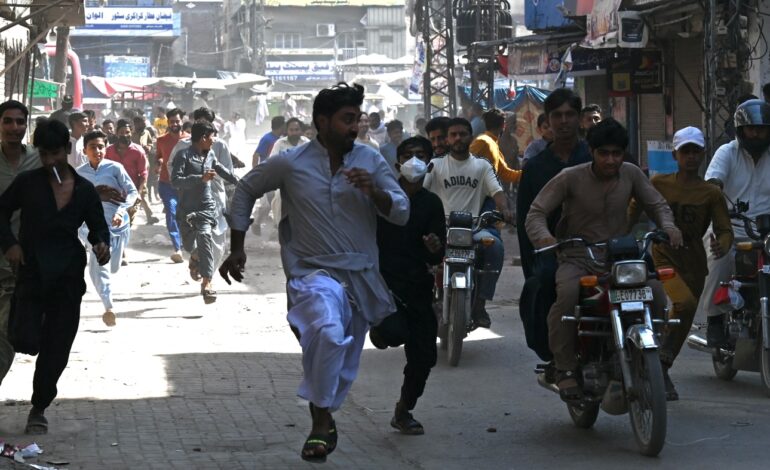Pakistan Bans Hard-Line Islamist Party After Violent Clashes

Pakistan has officially banned the hard-line Islamist party, Tehreek-e-Labbaik Pakistan (TLP), following violent clashes that resulted in at least five fatalities. This decision, made on Thursday, comes in the wake of a protest march from Lahore to the capital city, Islamabad, which escalated into significant confrontations between TLP supporters and law enforcement.
The violent events took place earlier this month, particularly in Lahore and the nearby city of Murdike. According to a statement from Pakistani Prime Minister Shehbaz Sharif, the federal cabinet unanimously approved the ban due to the party’s involvement in “violent and terrorist activities.” This latest action reflects the ongoing struggle between the Pakistani government and the TLP, a party known for its extreme views on blasphemy.
Background on TLP’s Influence and Activities
The TLP has gained considerable grassroots support since its official launch in 2017 by cleric Saad Rizvi. Its ideology, however, began to take root earlier, particularly after the assassination of Salman Taseer in 2011. Taseer, the governor of Punjab, was a vocal critic of Pakistan’s blasphemy laws, which can impose the death penalty for insults against Islam or its figures. Following his murder, perpetrated by his bodyguard Mumtaz Qadri, many hailed Qadri as a defender of Islam, further galvanizing support for hard-line sentiments.
The TLP’s demands for harsh penalties for alleged blasphemy have led to increased violence and mob lynchings, often occurring before any legal proceedings. This rise in violent incidents aligns with the TLP’s growing influence in Pakistani society, particularly in Punjab province, where the party has a strong ideological base.
The government of Punjab initiated the ban following the recent protests, which prompted security forces to raid the homes of TLP leaders and seal mosques associated with the party. According to Punjab’s information minister, Azma Bokhari, some TLP affiliates are now facing anti-terrorism charges. Bokhari characterized the TLP as “not a religious or political party” but rather a group that “hides behind religion to spread disorder.”
Political Dynamics and the Government’s Response
The TLP’s recent protests were reportedly organized in solidarity with Palestinians following a U.S.-brokered ceasefire between Israel and Hamas. Anticipating unrest, the Pakistani government suspended mobile internet services in Islamabad and restricted access to key areas with shipping containers to prevent large gatherings.
Both external and internal pressures influenced the government’s crackdown. According to Khurram Iqbal, an associate professor of security studies at Quaid-e-Azam University, recent shifts in Pakistan’s alignment with the United States have heightened sensitivities regarding protests near the U.S. Embassy. The TLP appeared to seize on this moment, attempting to leverage public sentiment against perceived American influence to bolster its support.
Senior journalist Azaz Syed noted that the TLP’s actions were aimed at showcasing Pakistan’s relationship with the U.S., hoping to galvanize further public backing. Yet, this strategy backfired, as both the civilian government and military leadership viewed the protests as a direct challenge to their authority.
The TLP has faced bans before, notably in 2021 following violent demonstrations over caricatures of the Prophet Muhammad published in France. After those protests, the ban was lifted under the condition that the party renounce violence.
In the wake of the current ban, Pakistani Defense Minister Khawaja Muhammad Asif emphasized the necessity of a “hard state” approach to counter religious extremism. He stated, “Such religious extremist groups, which resort to violence and cause damage to property, cannot be tolerated in Pakistan.”
The crackdown on the TLP aligns with a broader trend of stringent measures against various political factions, including the party of former prime minister Imran Khan, which has faced intensified scrutiny since 2023. Recent protests by Khan’s supporters against the TLP’s ban have raised constitutional concerns, indicating the ongoing tensions within Pakistan’s political landscape.
As the situation develops, the implications of this ban on the TLP and its supporters remain significant, potentially reshaping the dynamics of political and religious discourse in Pakistan.






